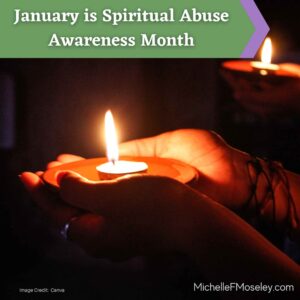January is Spiritual Abuse Awareness Month. The earliest I have found mention of this is 2012. However, it wasn’t until 2023 that I began seeing more information circulating about spiritual abuse and the recognition of Spiritual Abuse Awareness Month. Maybe this is the first time you’re hearing about it too.

What Is Spiritual Abuse?
Spiritual abuse is the conscious or unconscious use of power to direct, control, or manipulate another person, or to influence one’s capacity for choice within a spiritual or religious context.*
A person who is in a position to control or manipulate another within a spiritual context may consciously abuse that power. Some examples could include a pastor, leader, or priest making demands on someone’s time or finances, with no room for boundaries or denial of giving what’s asked. The spiritual aspect may arise from the fact that the person making the demands holds a leadership position within a religious group and/or utilizes Scripture to manipulate others into fulfilling their requests.
Abuse within a spiritual or religious context can also occur when the perpetrator is unconscious of the manipulation and control they enact. For example, a small group leader may not realize their authority in the eyes of some of the members of the group they lead. The small group leader may request that those in the group give up their time for a project, and not realize some of the group participants feel controlled. They don’t feel the freedom to say “no.” This type of interaction may also be experienced as spiritual abuse, and provides an important reminder that autonomy must be both communicated and respected.
Another way to think about spiritual abuse is to break down the words. Abuse occurs when someone is treated with violence, disrespect, cruelty, harm, or force. Their autonomy is taken away, and someone else is in control of at least a part of their life and/or behavior. When this happens in the context of a religious or spiritual group, that is spiritual abuse.
Other Helpful Vocabulary
Not everyone who has been harmed within a church or religious setting resonates with the concept of spiritual abuse. There are several other words or phrases that may more adequately reflect your own experience. I have included a few of those below:
- Adverse Religious Experience – any experience of religious belief, practice, or structure that undermines an individual’s sense of safety or autonomy, and/or negatively impacts their well-being
- Deconstruction – the process of evaluating and altering one’s previously held beliefs, lifestyle, relationship, or worldview
- Disenfranchised Grief – grief that goes unacknowledged or is viewed as unacceptable due to not fitting within the larger group’s attitude toward dealing with loss
- High-Control Religion – belief systems where leaders exert a large amount of control over members regarding multiple aspects of the members’ lives, and where there is an expectation that members will meet the demands of the belief system without regard for their personal health or well-being
- Religious Trauma – the physical, emotional, or psychological response to religious beliefs, practices, or structures that overwhelm an individual’s ability to cope and return to a sense of safety
- Religious Trauma Syndrome – a set of simultaneous symptoms and characteristics that are related to harmful experiences with religion, and are the result of immersion in a controlling religion and the secondary impact of leaving a religious group
Where To Now….
You may be familiar with these concepts and have been on your own journey of healing from spiritual abuse for some time. These terms and even the idea of abuse occurring in a spiritual context may be all new to you. Or perhaps you’re someone who has heard a bit about spiritual abuse or religious trauma, but are not really sure if / how those things impact you.
I invite you to hang around for the remainder of January as I plan to share a weekly post focused on topics related to spiritual abuse and healing. This will include sharing some general resources on the topics of spiritual abuse and religious trauma so folks can find what most resonates with them and their desire to learn more. I’m also excited to share some resources specifically focused on religious trauma within the Black Church, with the assistance of my colleagues from the Black Religious Trauma Recovery Network. Additionally, I plan to answer one of the questions I am most often asked by folks who are considering working with me in therapy – “What exactly does therapy for religious trauma include?”
I hope you’ll hang around to learn and share. The more awareness there is of spiritual abuse, the less likely it will continue to occur.
*I want to express my gratitude for the work of Marlene Winell, Reclamation Collective, Religious Trauma Institute, Center for Trauma Recovery and Resolution, and Craig Cashwell, Ph.D in crafting and sharing vocabulary and definitions to assist folks in discussing topics related to spiritual abuse.
Michelle F. Moseley is a Licensed Mental Health Counselor in NC. She believes ALL people deserve respect, compassion, and access to mental and physical healthcare. Michelle specializes in working with survivors of religious trauma and with those who have body image concerns, finding there is frequent overlap in these areas. You can learn more about Michelle by visiting her website at MichelleFMoseley.com or following her on Instagram – @therapy_with_michelle
Sign-up for Michelle’s Monthly Email Newsletter to make sure you never miss a blog post
